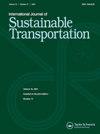Expanding electric-vehicle adoption beyond the national border: Insights for developing marketing policies for global electric-vehicle manufacturers
Abstract
The widespread adoption of electric vehicles (EVs) is one of the keys to achieving carbon-neutral by mid-century. This research examined the Americans’ perception of Chinese-brand electric vehicles (CBEVs) made in the US via structural equation modeling. The authors contracted a professional web survey company, which surveyed 400 Californian respondents in December 2020. We focused on California because the state has the greatest EV registration and accounts for approximately 260,000 or 47 percent of the US’s entire EV population. There are two unique approaches to this research, (1) proposing a mediation model and (2) examining country-of-origin effects in evaluating the factors influencing EV purchase intention in California households. The study results revealed that eco-consciousness does not directly invoke consumers’ purchase intention. Instead, the influence of eco-consciousness on purchasing behavior is mediated by quality judgment and the product's perceived value. The study also found that consumers’ animosity affects purchase intention indirectly by eroding consumers’ perceived value of CBEVs. Even though many foreign EV makers are attempting to increase their market presence and product adoption in the US market, their market share is still insignificant compared to conventional vehicles. Understanding factors that increase consumer acceptability of EVs is inevitable for building a successful market penetration.

 求助内容:
求助内容: 应助结果提醒方式:
应助结果提醒方式:


